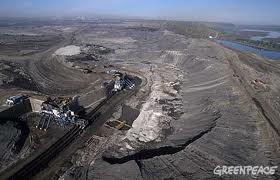The tar sands — sorry, I’m not going to use the more polite term “oil sands” since there is nothing polite about poisoning human beings and the earth — has been called the largest industrial project on Mother Earth: the Tar Sands Gigaproject.
The tar sands impact has been termed by environmental and Indigenous rights activists as: “slow industrial genocide.”
And yet no politicians have really discussed its impact, though Conservative MP Peter Kent has deemed the energy project “ethical.”
“Northern Alberta is ground zero for tar sands with over 20 corporations operating within the area that impacts the cultural heritage, land, ecosystems and human health of First Nation communities including the Mikisew Cree First Nation, Athabasca Chipewyan First Nation, Fort McMurray First Nation, Fort McKay Cree Nation, Beaver Lake Cree First Nation, Chipewyan Prairie First Nation, and local Metis peoples.”
I believe the tar sands should be an election issue — and a pointed note directed to both Conservative party leader Stephen Harper but also his Minister of the Environment, Peter Kent (MP; Thornhill) that as the Indigenous Environmental Network notes is — of local, provincial and Federal, “as stories of cancer epidemics in the community of Fort Chipewyan, massive wildlife losses related to toxic contamination, environmental degradation and increased vocal resistance from impacted communities have shattered the ‘everything is fine’ myth propagated by the Canadian and Alberta governments.”
A poll conducted in 2010 found that 50% of Canadian citizens believe the risks involved with tar sands projects outweighed the benefits. Yet, tar sands expansion continues.
In fact, the Conservative government is relying on the revenues generated through the tar sands. Currently, the tar sands operations produce about 1.5 million barrels of crude oil each day, the majority (97%) of this oil is exported to the U.S. In the next decade, if the government and industry get their way, production is expected to double and reach 5 million barrels of crude oil each day by 2030.
Conservative MP Peter Kent has stated his belief that Canadian tar sands oil is “ethical” in the context that it does not come from the Middle East, but this false argument neglects to factor in the damage the tar sands does to Canadian soil and Canadian communities — especially First Nations communities that far from the sight and concern of Ottawa — a situation of environmental racism.
Regarding tar sands oil, Kent told the Globe and Mail: “It is a regulated product in an energy superpower democracy. The profits from this oil are not used in undemocratic or unethical ways. The proceeds are used to better society in the great Canadian democracy. The wealth generated is shared with Canadians, with investors.”
But groups like Environmental Justice Toronto, Environmental Defense and the Indigenous Environmental Network (IEN) disagree with Kent and Harper’s stance — noting that the tar sands are anything but ethical to both Mother Earth and all the life upon her. In fact, activists feel the tar sands are both dangerous and foolish.
According to IEN, “The world is teetering on the brink of climate crisis. But attempts to avert it are being threatened by a massive industry in the Canadian wilderness. Major oil companies, banks and investors are pouring billions of dollars into the development of the Alberta Tar Sands.”You can read the full report here (pdf).
Taking the specific focus to the communities directly impacted by the tar sands: “If we don’t have land and we don’t have anywhere to carry out our traditional lifestyles, we lose who we are as a people. So, if there’s no land, then its equivalent in our estimation to genocide of a people.” George Poitras, Mikisew Cree First Nation
Impacts of continued tar sands development under the Conservatives:
— Currently, tar sands operations are licensed to divert 652 million cubic meters of fresh water each year, 80% from the Athabasca River. In comparison, this amounts to approximately 7 times the annual water needs of the city of Edmonton. About 1.8 million cubic metres of this water becomes highly toxic tailings waste each day.
— In 2008, tar sands operations produced 37.2 megatonnes of greenhouse gas emissions, an increase of 121% between 1990 and 2008. Planned tar sands growth indicates a near tripling of emissions between 2008 and 2020, to a projected 108 megatonnes.
— In 2006, unexpectedly high rate of rare cancers were reported in the community of Fort Chipewyan. In 2008, Alberta Health confirmed a 30% rise in the number of cancers between 1995-2006. However, the study lacks appropriate data and is considered a conservative estimate by many residents. [Alberta Cancer Board (2009). Cancer Incidence in Fort Chipewyan, Alberta 1995-2006. Government of Alberta.]
Sound ethical to you?



